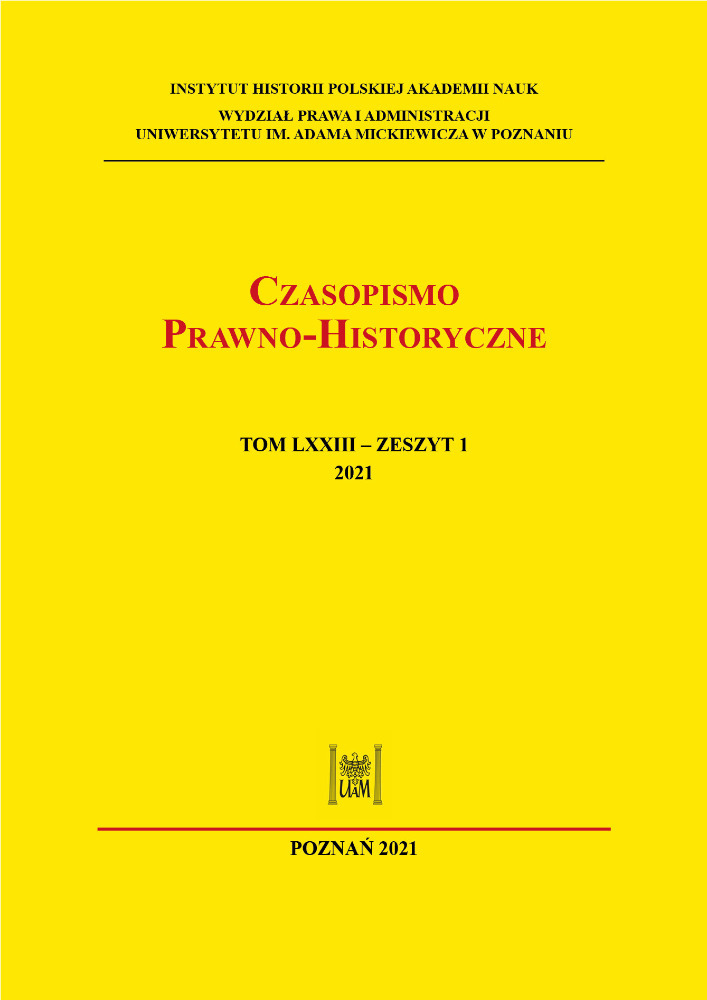Abstract
The dispute over the Austro-Hungarian border at Morskie Oko was, after the predatory partition of Poland in 1772, a continuation of a border conflict between the Kingdom of Poland and Hungary which started in the 16th century. The attempts to amicably delineate the border did not yield any results for the majority of the 19th century. In 1879, Christian Hohenlohe, a Prussian Prince, bought a border estate situated on the Hungarian side (a village called Jaworzyna) and he subsequently took steps with a view to seize the disputed territory. However, Count Władysław Zamoyski purchased lands in Galicia (Zakopane), located on the other side of the border, in 1889 and then he firmly resisted the claims of the Prussian magnate. The conflict concerning private property (a civil law conflict) continued to escalate and resulted in violence in the area and ended up in courts afterwards. However, without determining the political (state) affiliation of the disputed territory, no decisions made by the courts could be binding for the feuding parties. In the face of danger to safety and peace at the Austro-Hungarian border (there were even threats aimed at Galician court clerks with the use of firearms by Hungarian gendarmes), the governments in Vienna and Budapest came to a covert agreement and delineated a demarcation line. It was deemed that public disclosure of the compromise as well as of the concessions made by both parties would be used in political conflicts in both countries. As a consequence, it was decided that the blame should be put on the international arbitral tribunal. The paper presents solutions as well as the legal and political instruments used by both governments in order to secure such a court decision which would implement the international agreement they had previously reached and, at the same time, it would allow to lay the blame for the concessions on the tribunal.
References
Divêky A., Dzieje przyłączenia miast spiskich do Węgier w r. 1770-ym, „Przegląd Historyczny” 1921–22, t. 23, nr 1.
Helena z Lubomirskich Stanisławowa Gawłowska, Władysław Zamoyski Zakopane – Morskie Oko, oprac., posłowie i indeks osób Z. Nowak, Kórnik – Zakopane 2003.
Korn W., Der Streit um das Meerauge zwischen Österreich und Ungarn, „Österreichich-Ungariche Revue, Monatschrift” 1907, t. 35.
Kurtyka J., Początki starostwa spiskiego i pierwsi starostowie. Z dziejów polityki Władysława Jagiełły wobec Zakonu Krzyżackiego i Zygmunta Luksemburskiego w latach 1411–1430, „Studia z Dziejów Państwa i Prawa Polskiego” 2006, t. IX, cz. 1.
Leszczyński A., Ludowa historia Polski. Historia wyzysku i oporu. Mitologia panowania, Warszawa 2020.
Łazuga W., „Rządy polskie” w Austrii. Gabinet Kazimierza hr. Badeniego 1895–1897, Poznań 1991.
Matuszewski J., Ile procesów o Morskie Oko? [w:] Origines, fontes et narrationes – pośród kręgów poznania historycznego. Prace ofiarowane Profesorowi Marcelemu Antoniewiczowi w 65. rocznicę urodzin, Częstochowa 2018.
Matuszewski J., Postępowanie sądowe, administracyjne czy polubowne? Spór jeden a procedur wiele [w:] W. Chróścielewski, Z. Kmieciak (red.), Idea kodyfikacji w nauce prawa administracyjnego procesowego, Warszawa 2018.
Matuszewski J., Przypadek sądu polubownego z 1902 roku. Międzynarodowy trybunał w Grazu – powołanie, struktura, jurysdykcja, funkcjonowanie i orzeczenie. (teoria spiskowa) [w:] A. Moniuszko, M. Wąsowicz, A. Zakrzewski (red.), O przemianach kultury prawnej, Warszawa 2021.
Mniszek-Tchorznicki A., Wspomnienia moje odnośnie do sporu granicznego przy Morskim Oku [w:] J. M. Roszkowski, Walka o Morskie Oko w Tatrach 1811–1909, Kórnik 2018.
Nowak Z., Władysław Zamoyski a spór o Morskie Oko w latach 1890–1909, „Pamiętnik Biblioteki Kórnickiej” 1986, z. 21.
Rosco Bogdanowicz M., Wspomnienia, t. 2, Kraków 1959.
Roszkowski J. M., Spór o Morskie Oko na tle kształtowania się granicy w Tatrach [w:] S. Sierpowski (red.), Władysław Zamoyski 1858–1924, Kórnik – Zakopane 2003.
Roszkowski J.M., Spór o Morskie Oko, [w:] J.M. Roszkowski, „Zapomniane Kresy”. Spisz, Orawa, Czadeckie w świadomości i działaniach Polaków 1895–1925, Nowy Targ 2018.
Roszkowski J.M., Walka o Morskie Oko w Tatrach 1811–1909, Kórnik 2018.
Sierpowski S. (red.), Władysław Zamoyski 1858–1924, Kórnik – Zakopane 2003.
Akty prawne:
Dziennik ustaw państwa dla królestw i krajów w Radzie państwa reprezentowanych. Część IX – Wydana i rozesłana 28. stycznia 1897.
La Conference Internationale de La Paix. La Haye, 18 Mai – 29 Juillet 1899. Scholar select (French Edition) (French) Paperback – August 27, 2016.
Treaty between Her Majesty and the United States of America, signed at Washington, May 8, 1871.
License
Copyright (c) 2021 Jacek Matuszewski

This work is licensed under a Creative Commons Attribution-ShareAlike 4.0 International License.





